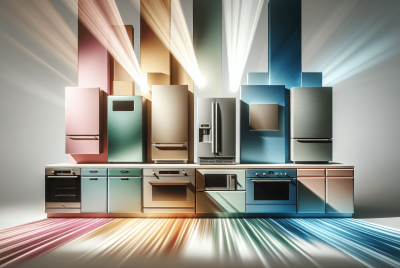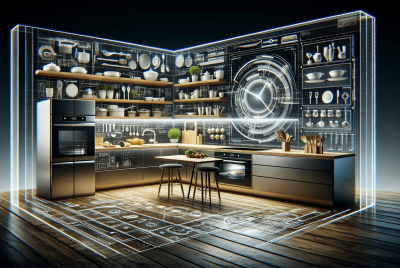What Is The Difference Between A Small Appliance And A Major Appliance?
Have you ever wondered what sets small appliances apart from major appliances? A small appliance refers to those nifty little gadgets that make our lives easier, such as toasters, blenders, or coffee makers. On the other hand, major appliances are the workhorses of our homes, like refrigerators, dishwashers, or washing machines. While both serve important roles in our daily routines, the distinction lies in their size, complexity, and overall functionality. Let’s dive into the world of appliances and uncover the differences between these two categories.
Definition of Small Appliance
A small appliance is typically defined as a portable or countertop gadget that is used for specific tasks in the home. These appliances are generally compact in size and designed to be easily stored and moved around as needed. They are often used for tasks such as food preparation, cleaning, or personal grooming.
Definition of Major Appliance
On the other hand, a major appliance refers to larger, fixed devices that are essential for various household functions. These appliances are typically built into cabinets or fixed to walls and require professional installation. Major appliances include items like refrigerators, ovens, washers, dryers, and dishwashers.

Size Comparison
Small Appliance Sizes
Small appliances are designed to be space-saving and convenient. They are generally compact in size, allowing for easy storage and often do not take up much counter or storage space. Examples of small appliances include toasters, blenders, coffee makers, and electric grills.
Major Appliance Sizes
Major appliances, on the other hand, are much larger and have a more significant footprint in a home. These appliances are designed to fulfill essential functions and may include refrigerators, stoves, washing machines, and dryers. Since major appliances are fixed in place, they require larger spaces in kitchens or laundry rooms.
Power Requirements
Small Appliance Power
Small appliances are typically designed to operate on standard household electrical outlets. Most small appliances have power requirements ranging from 600 to 1500 watts, depending on the specific task they perform. It is crucial to ensure that the electrical circuit can handle the power demand of the small appliance without overloading it.
Major Appliance Power
Major appliances generally have higher power requirements compared to small appliances. They often require specialized electrical connections, such as 220-240 volts, to provide the necessary power for their functions. This additional power requirement ensures that major appliances can handle heavy-duty tasks like cooking, cooling, and cleaning efficiently.

Functionality
Small Appliance Functionality
Small appliances excel at performing specific tasks quickly and efficiently. They are designed with a specific purpose in mind, such as blending, toasting, or brewing coffee. These appliances often come with various features and settings to provide versatility and ease of use. They are ideal for individuals or small households who require specific functions without the need for extensive capabilities.
Major Appliance Functionality
Major appliances, on the other hand, are designed to fulfill multiple functions and cater to the broader needs of a household. For example, a refrigerator not only cools and preserves food but also provides storage and organization options. Major appliances often come with advanced features and settings to offer a wide range of capabilities, such as self-cleaning ovens or energy-saving modes.
Lifespan
Small Appliance Lifespan
Small appliances generally have a shorter lifespan compared to major appliances. Due to their compact size and often less robust construction, small appliances may experience wear and tear more quickly. The average lifespan of a small appliance can vary depending on the quality of the product and frequency of use. However, with proper care and maintenance, small appliances can last for several years.
Major Appliance Lifespan
Major appliances are built to last and endure heavy use over an extended period. They are typically constructed with higher-quality materials and components, providing durability and reliability. The average lifespan of major appliances can range from 10 to 20 years, depending on the make, model, and maintenance practices. Regular maintenance and timely repairs can help prolong the lifespan of major appliances.
Cost
Small Appliance Cost
Small appliances are generally more affordable compared to major appliances. Due to their size and simpler functionality, small appliances are often priced competitively, making them accessible to a wide range of consumers. The cost of small appliances can vary significantly depending on the brand, features, and quality, but they are generally more budget-friendly and can easily fit into most household budgets.
Major Appliance Cost
Major appliances, being larger and more complex, tend to have a higher price point. These appliances require more substantial investments due to their advanced features, higher power requirements, and overall functionality. The cost of major appliances can vary greatly depending on the brand, capacity, energy efficiency, and additional features. While major appliances may be a significant investment, they are considered long-term purchases that contribute to the overall functionality and value of a home.
Repairability
Small Appliance Repairability
Small appliances are generally more straightforward in terms of construction and design, making them easier to repair. Their smaller size allows for easier access to components and often requires less technical expertise. Many small appliances come with accessible parts that can be replaced if necessary. However, the availability of spare parts may vary depending on the brand and model, which can affect the repairability of certain small appliances.
Major Appliance Repairability
Repairing major appliances can be more complex and challenging. Due to their size and intricate design, major appliances often require professional expertise for repairs and maintenance. The availability of specialized parts for major appliances can also vary, making repairs more time-consuming and potentially expensive. It is recommended to rely on authorized service technicians or repair specialists for major appliances to ensure proper and safe repairs.
Frequency of Use
Small Appliance Use Frequency
Small appliances are often used on a daily or frequent basis, depending on the specific task they perform. For example, a coffee maker may be used every morning, while a toaster may be used daily for breakfast. Small appliances are designed for convenience and ease of use, making them accessible for regular use.
Major Appliance Use Frequency
Major appliances are typically used on a less frequent basis, depending on the household’s needs and routines. For example, a refrigerator, oven, or dishwasher may be used multiple times a day, while a washing machine and dryer may be used a few times a week. The frequency of use of major appliances varies depending on factors such as family size, lifestyle, and specific requirements.
Examples
Small Appliance Examples
Some examples of small appliances include:
- Toaster: Used for toasting bread, bagels, or pastries.
- Blender: Used for blending and pureeing ingredients for smoothies, soups, or sauces.
- Coffee Maker: Used for brewing coffee using ground beans or single-serve pods.
- Electric Grill: Used for grilling indoors, often on countertops or tables.
- Handheld Vacuum Cleaner: Used for quick and convenient cleaning of small areas.
Major Appliance Examples
Examples of major appliances include:
- Refrigerator: Used for food storage and preservation, with options such as freezer compartments and temperature control.
- Oven: Used for baking and cooking food with various cooking modes and temperature settings.
- Washing Machine: Used for cleaning clothes, often with different wash cycles and settings.
- Dryer: Used for drying clothes after washing.
- Dishwasher: Used for cleaning and sanitizing dishes, utensils, and cookware.
In conclusion, the difference between small appliances and major appliances lies in their size, functionality, power requirements, lifespan, cost, repairability, and frequency of use. Small appliances offer specific task-oriented functionality, are more portable, and have a shorter lifespan compared to major appliances. Major appliances, on the other hand, are larger, more versatile, and designed for broader household needs, with higher power requirements, longer lifespan, and often higher costs.



